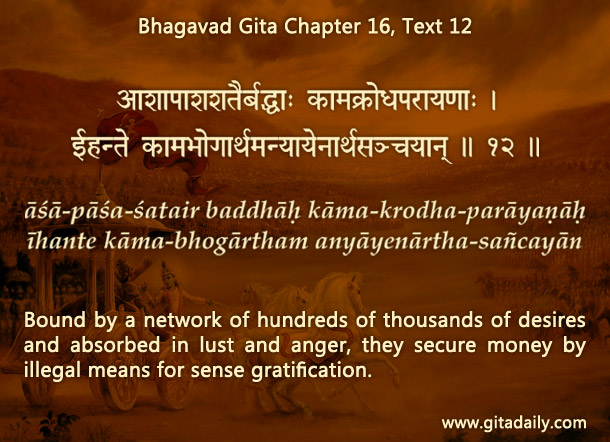What we initially indulge in casually we eventually indulge in compulsively
When contemporary culture tempts us with addictive indulgences such as drinking, it often offers a common rationalization, “Just drink once. It’s no big deal.”
However, such casual indulgences can easily become a big deal because our mind is highly impressionable. Each indulgence forms an impression on our mind, and that impression comes up as a future proposition for repeat indulgence. Soon, we find ourselves indulging more frequently, more forcefully, more recklessly.
The Bhagavad-gita (16.12) underscores this entangling nature of indulgence when it declares that desires are like shackles. Whenever we gratify a wanton desire by enjoying a sense object, between that object and us is formed an invisible rope. And with each indulgence, that rope becomes thicker and tighter, thereby increasing the pull of our desire for that object and decreasing our capacity to resist that pull. Eventually, those desire-shackles drag us across ethical boundaries.
For those thus shackled, fulfilling their desire consumes their entire consciousness, their whole life, their very being. They become addicts. Scarily, the future verses (16.13-15) describe how such people may become mercenary and even murderous. Social science statistics reiterate that addiction is a consistent predictor of criminality. Good people end up doing bad things, even terrible things, because they are dragged by the desires that shackle them. Thus, one small indulgence can become consequential, even catastrophically consequential.
Understanding how impulsive indulgence becomes compulsive, we stop taking it nonchalantly and strive to desist from it. Gita wisdom explains that desisting from indulgence needs to be complemented by persisting in our pursuit of transcendence.
When we strive to conscientiously absorb ourselves in Krishna by practicing bhakti-yoga, understanding that such absorption is the best protection from temptation, we become steadily, increasingly purified. Till we become spontaneously and joyfully absorbed in Krishna, thereby transcending the reach of temptation.
Think it over:
- How do casual indulgences become compulsive?
- What two measures can protect us from sensual entanglement?
- How can we transcend the reach of temptation?
To know more about this verse, please click on the image
Explanation of article:
https://youtu.be/xKGDrJrV3RU
Podcast:


Leave A Comment